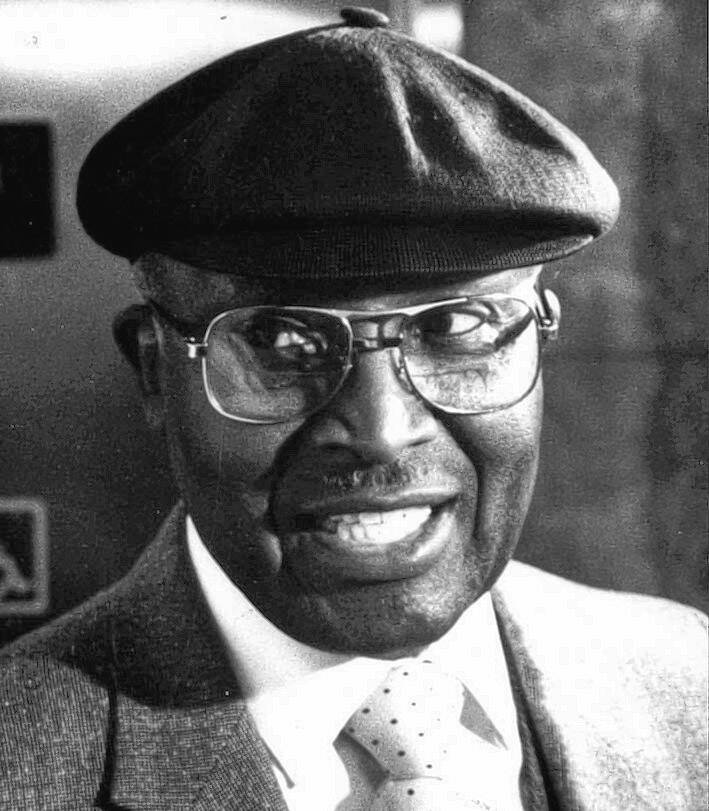Overcoming prejudice: The story behind Nevada’s first Black legislator
When Nevada Assemblyman Woodrow Wilson went into a Carson City bar where fellow legislators “did their politicking” in the 1960s, they told the owner they wouldn’t continue patronizing the bar if Wilson, who was Black, was there.
The bar owner told Wilson about the incident, and he learned the legislators were the same ones who had tried to buy him drinks and make him feel welcome.
“Being a minority in this community, the odds were tremendously stacked against me being elected,” Wilson had said in a 140-page written oral history, which is in the UNLV library’s special collections.
“There was a tremendous suspicion of just what I would do up there. How will I act? What tactics will he use to make his point?” he had said.
Besides shattering the glass ceiling for others in the public sphere as Nevada’s first Black legislator, Wilson also was a pivotal player in integrating the Las Vegas Strip, providing financial support for Black families and pushing for open housing in what was once a segregated Las Vegas.
“I think Woodrow’s influence was widespread,” said Claytee White, a historian and director of the Oral History Research Center at UNLV. “He would have definitely set the tone and showed people what was possible.”
From the South to the West
Wilson was born in 1915 in the sawmill town of Morton, Mississippi. He started working at 8 years old, helping out with farming and picking cotton, according to his oral history.
He was also one of the few children in his town who had the opportunity to go to a boarding school. He graduated from high school at Piney Woods in Mississippi and attended junior college in 1934, playing semi-professional baseball and joining a traveling group of singers called the Cotton Blossom Singers.
In 1942, Wilson moved to Nevada with his family and sought work at Basic Magnesium Inc., a major magnesium plant that was established in Henderson to produce magnesium for the war effort, Wilson said in an oral history conducted in 1972 when he was 57.
Though he planned to be in Nevada for a few weeks before heading to California, he ended up staying on at the plant for over 30 years, working as a warehouseman and retiring as a foreman, according to a 2001 resolution the Assembly passed about him following his death at the age of 84 in 1999.
Living in a segregated Sin City
At the time Wilson arrived in Las Vegas, segregation was still in full swing. Black residents lived in the Westside, as they could not qualify for bank financing if they wanted to buy property anywhere else, according to White.
Black Las Vegans didn’t work the same jobs on the Strip as white people. They remained in the back of the house as maids, porters and linen room workers, White said. Black performers who played on the Strip couldn’t stay on the Strip and instead had to stay in boarding houses in the Westside, White said.
Wilson experienced that discrimination often.
“When I came to Las Vegas, the social situation particularly involving Black people was just degrading,” he said in his oral history. “It was humiliating from every standpoint.”
Wilson said he faced many racist experiences, from an ice cream store refusing to serve him and his daughter to being told he couldn’t sit in the general admission section of a movie theater in downtown. He and his party refused to move, even when police were called.
Wilson was also denied a housing application in a private housing project in the Huntridge neighborhood.
“Black people had money,” Wilson said in his oral history book. “Money wasn’t the problem; it was a restrictive, discriminatory practice that was the problem.”
Activism in the community
Almost from the time he first moved to Las Vegas, Wilson began speaking out about segregation and getting involved in local organizations.
He got involved in the American Federation of Labor union while working at the magnesium plant. Wilson pushed for the company to hire Black women, whom he had to recruit himself.
During his tenure as president of the Las Vegas chapter of the NAACP beginning in 1952, Wilson confronted then-Sen. Pat McCarran over his voting record with Southern senators against civil rights. In 1942, Wilson led a march to City Hall in an effort to integrate the Shamrock Hotel.
When he heard reports from the Davis Dam construction site in Laughlin that Black workers couldn’t eat in the mess hall or stay in the barracks, he went down and told the manager that he was making a report for the NAACP. After that, the mess hall and barracks opened up to the Black employees, Wilson said during an oral history interview.
Perhaps Wilson’s biggest mark he left, however, was his co-founding of the Westside Federal Credit Union, where he worked as its treasurer-manager for 42 years and remained on its board of directors until he died in 1999.
The credit union provided loans to African Americans, who at the time of the union’s founding could not get the kind of loans other people could due to redlining, White said.
Entering politics
Wilson decided to join the Republican Party because he looked at the predominantly Democratic political structure and unions in Southern Nevada.
“I thought when you’re putting all your eggs in one basket, those that are coming up from the bottom are a mite rotten. It creates a mesh of inconsistency. We have to have an opposition to bring out the best. The Republican Party in Las Vegas was struggling, and I thought, ‘I’m going to join the Republican party.’ ”
Friends and fellow Republicans, including Paul Laxalt, encouraged Wilson to run for the Legislature, according to his written oral history.
Even though many in the Westside Black community were Democrats, they campaigned for him, he had said, and he went door-to-door, even in white areas.
Wilson was elected to the Assembly in 1966 — just a year after the Voting Rights Act of 1965 was signed, prohibiting racial discrimination in voting, and served three terms, pushing for open housing legislation, welfare reform and anti-discrimination regulations.
White imagines that it was “hell every day” for Wilson while he was in the Legislature. Just a few years after Wilson’s tenure, Joe Neal, who became Nevada’s first Black state senator, was called “19 to one” because every other senator would vote the opposite of him, White said.
“I’m sure it was that way and probably even more harsh for Woodrow Wilson,” she said.
Wilson was credited with pushing through the Nevada Fair Housing Law, which outlawed discriminatory practices in home sales, and he helped pass legislation that mandated fair employment practices, vocational education and improved benefits for injured workers, according to a 2001 Assembly resolution.
“I didn’t go up there to the capital expecting to turn the world over, turn everything around there,” Wilson said. “If I found an adversary in a particular situation, I’d invite him to lunch; I’d go invite him to dinner. And we’d go right down the line, and I’d ask him why were his attitudes such. He would explain to me.”
He also helped get charges dropped against a group of Black students at University Nevada Reno in a case where they were accused of unethical conduct. Wilson called the hearing a prejudiced “kangaroo court” with “frivolous” charges.
“After I finished, they dropped it, and the young men were vindicated and went back to class,” he said.
Though he got things done, it wasn’t easy for him up in Carson City.
“When I first went to the Legislature in 1967, I was an oddity,” Wilson said in his oral history. “I was something they’d never seen before: a Black in the legislative body.”
Wilson described an experience in which an elderly woman who attended the first day of every legislative session stuck her hand in his mouth to see if he had false teeth.
Wilson also helped with reapportionment — or redistricting — and set up a senatorial district that covered most of the Westside and North Las Vegas, which would give people the opportunity to elect a Black person to the Senate, he said in his oral history. Wilson also cut up two predominantly Black assembly districts in Las Vegas to pave the way for two minority legislators.
He decided to run for that Senate seat in 1972, but he lost to Neal, who became the first Black state senator.
After the Legislature
Later, Wilson was elected to the Clark County Commission in 1980. In that role, he helped draw up the design for the Las Vegas airport and helped acquire properties around the location for expansion, according to his oral history.
He resigned four years later, however, ensnared in an FBI sting operation in which he accepted money, and he lost his commission position, White said.
“He lost the respect of a lot of people, (but) not the Black community,” White said.
Wilson pleaded guilty to accepting a $5,000 bribe from an undercover FBI agent. He and another state senator had admitted to accepting payoffs in 1981 from an agent in exchange for their political influence, and the probe was part of the political investigation named Operation Yobo that saw five public officials convicted for corruption, according to a 1984 Review-Journal article.
After that, there’s not much other public information about him, White said.
Throughout his career, he was recognized as a Distinguished Nevadan by UNLV and awarded for his service to the Republican Party. He had served as chairman of the Nevada Equal Rights Commission and the Nevada State Advisory Committee for the U.S. Commission on Civil Rights, and he was involved in several organizations, from the Boy Scouts of America to the Kiwanis Club.
His daughter, JoAnn Conners, described him as “a civil rights leader, freedom fighter, community leader, bank founder and equal rights organizer,” according to an Assembly resolution passed after he died.
“Woodrow Wilson will long be remembered as a man who fought hard for equal justice for all and dedicated his life to helping Blacks throughout the State of Nevada,” the Assembly resolution said.
In an obituary published in the Review-Journal, his wife Addie Mae Wilson said he loved helping people.
“He was a happy, joyful man, and anything he could do for you, he’d do it,” she said.
Contact Jessica Hill at jehill@reviewjournal.com. Follow @jess_hillyeah on X.



















